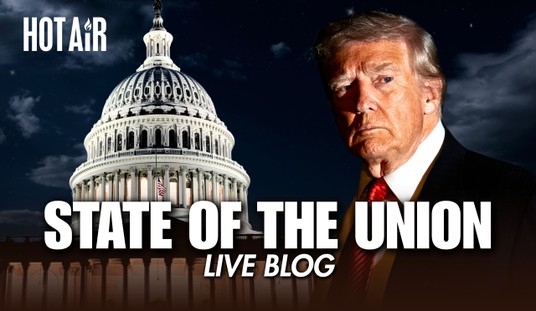It’s a good question, but it assumes facts not in evidence — yet. The Washington Post’s Aaron Blake looks at two normally determinative factors in presidential elections, both of which should play in Donald Trump’s favor, and yet neither of which appears to be bolstering his polling, Blake argues. One is the James Carville standard of “it’s the economy, stupid,” but the more predictive of these is the Ronald Reagan question: are you better off than you were four years ago?
Gallup polled on the latter two weeks ago, and found a re-elect cycle record of 56% said yes to that question — eleven points higher than Barack Obama got in 2012. Blake argues that Trump’s polling doesn’t reflect that because it doesn’t ask the right question in this cycle:
A New York Times-Siena College poll echoed the Gallup poll to some extent, with 49 percent of Americans saying they are better off than four years ago, while just 32 percent said they are worse off. By the logic of the man who initially made the question famous in 1980, Ronald Reagan, this would suggest that Americans will vote for Trump because they are happy with their relative life status.
But then the Times-Siena poll asked people a slightly different version of the question: Setting aside how people personally felt about their situation, it asked, “Do you think America is better off or worse off than it was four years ago?”
On this question, the verdict was distinctly different. Just 39 percent said the country was better off than four years ago, while 55 percent said it was worse off. When it came to whether things were worse than four years ago, the number jumped from 32 percent for people’s personal situations to 55 percent for the country’s situation — increasing by at least 16 points for every demographic except Republicans. Positive views overall dropped from 49 percent to 39 percent.
The split is similar in other recent polling.
In a USA Today-Suffolk University poll released Wednesday, for instance, 51 percent of Pennsylvania voters said they were better off compared with four years ago, while 30 percent said they were worse off. But voters said by an even larger 57-to-32 margin that the country was on the wrong track.
Count me a bit skeptical on all counts. If we rely on the “track” question, no incumbent would ever win re-election. That question is designed to be a gripe trap for polling; it almost always runs negative, as voters are almost always unsatisfied with the status quo in some way. And it’s not too tough to extrapolate that out to a question about America’s status too, which is (a) another way to ask the “track” question, and (b) almost certainly greatly colored by the pandemic and unrest this summer. The latter can’t be blamed on Trump, and arguably not the former either much at all, even if people are dissatisfied with his response.
If you want an example of this phenomenon in action, just take a look at Congress’ approval ratings at any one time, which usually lies between used-car salesmen and telemarketers. If this was determinative, no one would get re-elected to the House or Senate, and yet incumbent success rates are historically in the 90% range. How does that happen? People vote on their own status and their personal connection to the incumbent, not on their overall view of Congress, just as they don’t vote on right/wrong track questions.
The reason the Reagan question resonates is because it asks voters to share their personal status. Reagan understood better than anyone that the personal connection is how many voters, if not most, make their ballot choices in national elections. Joe Biden wants it to be a referendum on Trump himself, but for most people, it’s a referendum on themselves. If they see their situation as improving, then they won’t want to change horses, at least generally speaking. And that worked for Reagan even while Jimmy Carter’s campaign was painting him as a radical right-winger who would sell out working-class folks to billionaires. Sound familiar?
So why isn’t that showing up in electoral polls? For one thing, Trump’s personality and style are remarkably off-putting to many, so he’s not ever going to be widely popular. However, this actually does show up in polling — in Gallup’s party-ID polling, which has shown steady gains by Republicans all summer long, or at least steady declines by Democrats. The shape of the electorate has changed, perhaps significantly, and it may well be because voters have begun to ask themselves the Reagan question — or perhaps have been revulsed at the rioting of the Left and have concluded that Trump isn’t the worst option after all.
Why hasn’t that shown up in media polling? That may have to do with likely-voter modeling, which was always going to be dicey this year. If pollsters are using high-turnout modeling based on the 2018 midterms, when Democrats had a D+6 and an eleven-point advantage in the indie split in party identification, then they may be moving the data in the wrong direction. If that’s their model and this continues to be an R+1/D+3 indie split electorate, pollsters had better get ready for a big miss.
If this sounds like a replay of the “unskew the polls” effort in 2012, it’s not quite the same thing. In 2012, pollsters got the model right by nailing the shape of the electorate as similar to 2008 and not 2010. However, their critics missed why that was the case — because of Barack Obama’s superior and massive ground organization, which he hadn’t deployed much at all two years earlier (and wouldn’t in the following midterm either). In this election, Biden doesn’t even have a ground game, while Trump and the RNC have been making big gains in voter registrations in battleground states. That might also be driving the party-ID polling, and if it is, then pollsters have to account for that in their modeling.
It’s quite possible that Trump will lose, but it’s also possible that the party-ID shift indicates that he and the GOP are in better shape than electoral polls suggest. Until the election results are in, I’d say it’s better not to assume facts not yet in evidence. Just remember this: Elections are won on the ground, not in the air.








